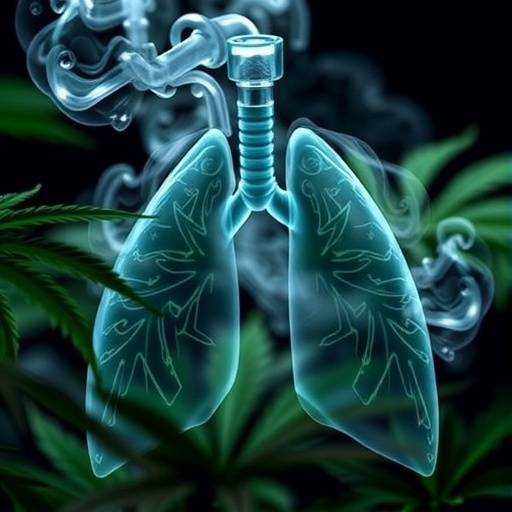In a groundbreaking study published in the Journal of General Internal Medicine, researchers investigated the effects of inhaled cannabis on individuals suffering from chronic respiratory conditions, specifically asthma and Chronic Obstructive Pulmonary Disease (COPD). This extensive cross-sectional study surveyed a staggering 379,049 participants, representing a diverse demographic and addressing a pressing issue in public health. The results shed light on the complex interplay between cannabis usage and respiratory health, prompting both excitement and concern among the medical community.
The study began with the hypothesis that inhaled cannabis could potentially serve as a therapeutic agent for individuals suffering from asthma and COPD. Researchers were intrigued by anecdotal reports suggesting that some patients experienced relief from their symptoms after using cannabis. Prior to this investigation, however, empirical data on the subject was scarce, leading the team to embark on a comprehensive study aimed at filling this evident gap in knowledge.
Utilizing a robust methodology, the researchers designed a survey to capture a wide array of data concerning participants’ demographics, medical histories, and cannabis usage habits. The survey was disseminated across various platforms, ensuring a broad reach and diverse representation of the population. Participants were asked about their frequency of cannabis use, the mode of consumption—whether through smoking, vaping, or edibles—and the specific respiratory conditions they were facing.
As the data poured in, the research team diligently began to analyze the results. Among the respondents, indications of canna-induced symptom relief were noted, particularly in patients with asthma. This pointed toward the possibility that cannabis might have anti-inflammatory properties, which could theoretically alleviate some respiratory symptoms. However, the findings were not universally positive; the results also raised initial concerns regarding the potential adverse effects of smoking cannabis, particularly in those with pre-existing lung conditions.
A segmented analysis of the data revealed that while some participants reported improved respiratory function and overall quality of life, a considerable percentage experienced negative side effects associated with smoking cannabis. These effects included increased coughing and wheezing, highlighting a critical aspect of the discussion surrounding cannabis and lung health. The dichotomy of results suggests that while some individuals might benefit from inhaled cannabis, others could be exacerbating their conditions—a contentious point that demands further exploration.
In light of these findings, the researchers emphasized the necessity of individualized medicine. They argued that patients considering cannabis as an alternative treatment option should consult healthcare professionals to evaluate potential risks and benefits based on their unique medical backgrounds. This sentiment echoes a broader movement within the medical community towards personalized care, particularly in the context of chronic illness management.
Further complicating the narrative are the varying legal and societal attitudes towards cannabis use across different regions. While some areas have embraced cannabis as a legitimate treatment option, others maintain stringent prohibitions, limiting access for those who could potentially benefit from its therapeutic properties. This discrepancy highlights an urgent need for comprehensive policies that consider the nuances of cannabis usage in clinical practice, particularly for respiratory illnesses.
Moreover, the researchers pointed out the pressing need for longitudinal studies to track the long-term effects of inhaled cannabis on respiratory health. The current study provided a snapshot in time, but further research could illuminate the potential risks or benefits that might emerge as individuals navigate cannabis usage over extended periods. As the landscape of cannabis research evolves, the medical community must remain vigilant in examining emerging evidence and adapting treatment protocols accordingly.
The results of this study are sure to ignite debate among practitioners and patients alike. Cannabis remains a polarizing subject within healthcare, with strong arguments on both sides regarding its efficacy as a medicine. Healthcare professionals are urged to remain informed on the latest findings as more patients turn to alternative remedies for their chronic conditions. As the conversation around cannabis grows, the role of healthcare providers in guiding patient choices becomes increasingly important.
Public health officials and policymakers are likewise encouraged to consider the implications of this research when developing guidelines surrounding cannabis use, especially for respiratory conditions. Given the increasing prevalence of asthma and COPD worldwide, informed, evidence-based strategies will be paramount in managing these chronic diseases effectively.
In conclusion, the study conducted by Rustagi, Jeffers, Graham, and colleagues serves as a significant contribution to the field of respiratory medicine and the ongoing discourse surrounding cannabis use. While the findings indicate potential benefits for some individuals, they also underscore the importance of caution and thorough consultation. Ultimately, this research reinforces the notion that cannabis may not be a panacea; rather, it may serve as an important therapeutic consideration that warrants careful evaluation on a case-by-case basis.
As the world continues to navigate the complex intersections of cannabis, health, and illness, research like this will be pivotal in shaping informed discourse and guiding responsible policy-making. The call for more rigorous clinical trials and longitudinal studies is loud and clear, as the medical community seeks to better understand the role of cannabis in chronic respiratory conditions.
Subject of Research: Inhaled Cannabis and its impact on asthma and COPD
Article Title: Inhaled Cannabis, Asthma, and Chronic Obstructive Pulmonary Disease: A Population-Based Cross-Sectional Study
Article References:
Rustagi, A.S., Jeffers, A.M., Graham, F.J. et al. Inhaled Cannabis, Asthma, and Chronic Obstructive Pulmonary Disease: A Population-Based Cross-Sectional Study of n = 379,049. J GEN INTERN MED (2025). https://doi.org/10.1007/s11606-025-09833-8
Image Credits: AI Generated
DOI: 10.1007/s11606-025-09833-8
Keywords: Inhaled cannabis, asthma, chronic obstructive pulmonary disease, respiratory health, personalized medicine, public health policy
Tags: asthma and COPD treatment researchcannabis usage and respiratory conditionscannabis use among chronic illness patientschronic respiratory disease studiesdemographic impact on cannabis health studiesempirical data on cannabis and lung healthinhaled cannabis effects on lung healthmedical community concerns about cannabispublic health implications of cannabissurvey methodology in health researchtherapeutic potential of inhaled cannabis





